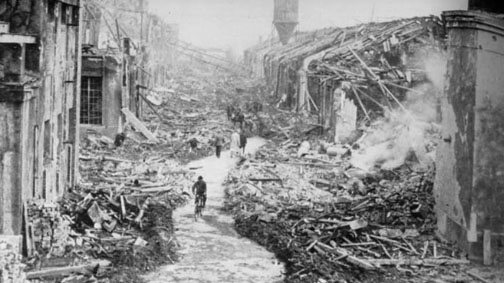Buruma, Ian, Year Zero: A History of 1945, The Penguin Press, New York, 2013 (368 pp. $31.50)
The great cultural critic Walter Benjamin reminds us of a Paul Klee drawing called “Angelus Novus”, which depicts the angel of history staring fixedly at something distant while a steady wind blows his outstretched wings from behind. The angel is contemplating the past, which he understands as a single great catastrophe piling ruin upon ruin. While preferring to stay and awake the dead and make whole what has been smashed, the wind is blowing from Paradise and has caught the angel’s wings with such violence that he can no longer close them. This irresistible future towards which we are blown is called progress.
With this reminder Professor Ian Buruma’s commences his masterpiece of panoramic history, Year Zero: A History of 1945, a landmark work combining detailed scholarship, luminous imaginative power, and great personal intensity. Many things encouraged people to believe that 1945 would be a blank slate and that history would finally be discarded for a New Start. People everywhere pined for normal life to resume; there was a belief that a better world could emerge from the ashes of the Holocaust, from the complete collapse of Nazism and fascism, from the moral bankruptcy of the old regimes and colonial empires worldwide. The year 1945 was the year of Never Again—soldiers would come home and take up the cause of peace, governments would create a United Nations and disallow war, and everywhere the ruins would be swept away. The great filmmaker Roberto Rossellini titled his film about life in Berlin after the war, “Germany, Year Zero”.
Buruma, Luce Professor of Democracy, Human Rights, and Journalism at Bard College, is the distinguished author of many works of history and culture including Murder in Amsterdam, God’s Dust, and Taming the Gods, and he contributes regularly to the New York Review of Books. Buruma’s personal intensity in Year Zero proceeds from the fact that as a boy he watched his law student father taken from their home at Nijmegen in Holland and sent to Germany as a slave laborer. At the end of the war, Buruma’s father had survived, barely, escaping Allied bombing and the arrival of Soviet Shock Troops. During the chaos, he passed through eastern Berlin as soldiers battled in the streets. Sometime in April, he watched as the Soviets took Hitler’s chancellory, then took refuge at a German woman’s home. In May, he was discovered by Soviet soldiers and taken out for execution. Luckily, fate intervened and he was saved. Like many who survived, he believed in “normalcy” and peace.
Year Zero is a book filled with unnerving detail, imparting a kind of clairvoyant insight into the human condition. In Czechoslovakia in the summer of 1945, for example, near the town of Budweis, best known for fine beer, stood a concentration camp. Above the camp was a hand-lettered sign that read: “An Eye for an Eye, A Tooth for a Tooth”. Now under Czech control, the camp was filled with German prisoners. The Czech commandant, a particularly savage young man, put the Germans to work on minimal rations for twelve hours a day, woke them in the middle of the night, and made them sing, crawl, dance, and beat each other, among other torments. Elsewhere, American guards stood by at Dachau while SS were lynched. And so it was that the wind of progress also blew in revenge.
Year Zero is also a book filled with panorama and grand scale. Buruma recounts the American military occupation of Japan, the collapse of Manchuoko, and the nascent civil conflicts in China and Vietnam with uncanny precision. Allied efforts to reconstitute Europe, the creation of the United Nations, de-Nazification, and home-front attitudes are all given thought-provoking treatments. In fact, the themes of Year Zero are confidently announced in chapter headings: Exultation, Hunger, Revenge, Going Home, Draining the Poison, The Rule of Law, Civilizing the Brutes and One World. Brilliantly written in an engaging, personal and direct style, Year Zero is that rare creature, a serious book that is hard to put down. Handsomely illustrated with fine photographs and an excellent set of notes, Buruma has produced a great book of popular history.
Yes, 1945 was a year of Hope, a year of Utopian Fervor. The world would not revert to what it was. Indeed, Year Zero gave rise to European social democracy and Union, the United Nations, Japanese pacifism and the decolonization of Asia and parts of the Middle East. Political re-education was imposed by the victors on a scale previously unimagined. Soon, however, the wind began to blow again. The drama of the Great Catastrophe opened for business and the world resumed piling up its ruins as before.


